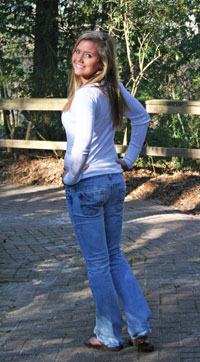Acute Lymphoblastic Leukemia Survivor
Childhood cancer shapes career plans
 Breean Kulhanek is an energetic sophomore at the University of Texas in Austin studying Human Development and Family Science. She is an honors student, a member of the Texas Lonestars and she helps at the children’s hospital where she was treated for cancer as a child. She hopes to be a child life specialist who educates and comforts sick children and their families in the hospital.
Breean Kulhanek is an energetic sophomore at the University of Texas in Austin studying Human Development and Family Science. She is an honors student, a member of the Texas Lonestars and she helps at the children’s hospital where she was treated for cancer as a child. She hopes to be a child life specialist who educates and comforts sick children and their families in the hospital.
Breean’s parents were thrust into a nightmare when she was diagnosed with acute lymphoblastic leukemia (ALL) at the age of two. With the help of their beloved pediatric oncologist, her parents — Jana and Dan Kulhanek — weathered the storm. After undergoing chemotherapy, she went into remission and has remained in remission since that time.
Breean has two brothers and they live in the family’s hometown of Spring, Texas. Her family calls Breean their “carpe diem” girl who volunteers at a camp for young cancer patients and parachuted from an airplane on her 20th birthday.
Having leukemia as a child has been the “best worst thing” that has happened in my life — and I can say it has affected me in a very positive way. While the illness may not have been a blessing, the impact it has made on my life and all the people I have met certainly has been. Being a cancer survivor has shaped how I live and my goals for the future.
I was diagnosed with leukemia when I was two years old. After my diagnosis, I began six months of intense chemotherapy, but I actually went into remission after the first month. I still had another two years of routine chemotherapy where I would go to the hospital for treatments and then go home.
I don’t remember much of the bad parts because I was so young. What I do remember were certain nurses and child life specialists who were so helpful to my family, and had candy and treats for me. These women have helped shape my career path and the activities with which I’ve become involved.
After I finished my treatment, my parents were cautious with my health, but they didn’t want me to miss out on anything. They enrolled me right away in gymnastics. I went on later to compete in both gymnastics and cheerleading.
At the encouragement of my oncologist, my brother and I also went to a summer camp for cancer patients and their siblings. Those were some of the best weeks of my life -— with wonderful counselors and activities that every child could do. I now volunteer as a counselor at that same camp and can relate so well with the campers. I can honestly say, “I know how you feel.”
When I was younger, I sometimes felt different and ostracized because of my illness. As a teenager, however, I began to realize how fortunate and blessed I had been, and that there are others in the world facing the same or similar challenges. This realization began to take root in my life, and that’s when I started to volunteer with other cancer survivors.
So, when people ask why cancer was the “best worst thing” that has happened to me, I tell them that it came into my life to help me see the world from a different perspective. Quite possibly, God’s plan may be for me to become a shoulder for those families whose children are critically ill. And my cancer experience may have been just the nudge that set me on the course.
Mom’s Experience
Things moved fast when Breean was diagnosed with leukemia. We went from her waking up with a raging fever one night, to 10 days later being admitted to the children’s hospital for chemotherapy treatment. Breean’s pediatric oncologist turned out to be her angel on earth. When she was first diagnosed, we were in shock, but her oncologist told us that this was a “garden-variety” leukemia — we would treat Breean and she would be fine. I couldn’t imagine any leukemia being garden-variety, but she was right.
Breean was very lucky because she never relapsed. The cancer was caught early and she was always on a low protocol. There was the awful part of bone marrow tests and spinal taps, but when we would be getting ready to go for treatment, she would just ask if it was a “big owie” or a “little owie” day.
When she was younger, Breean was self-conscious about her history, and didn’t really like to talk about it. As she has matured, she has realized that her peers and others are not put off by her story and that her survival is seen more as a badge of courage.


